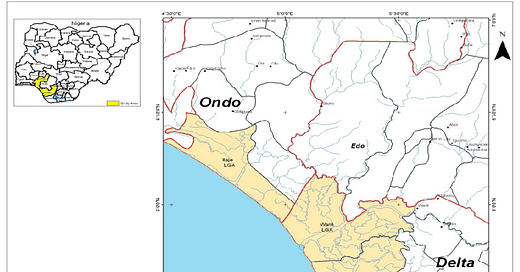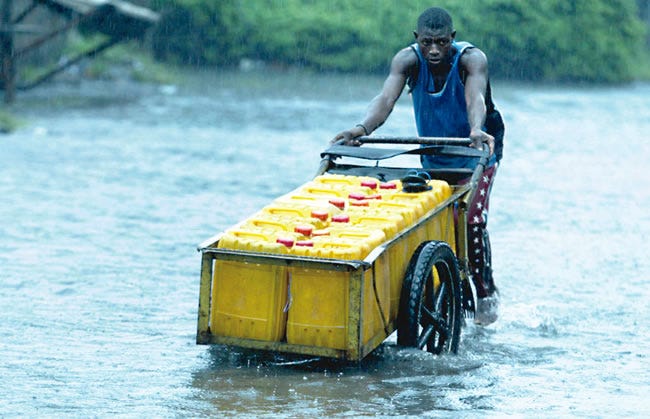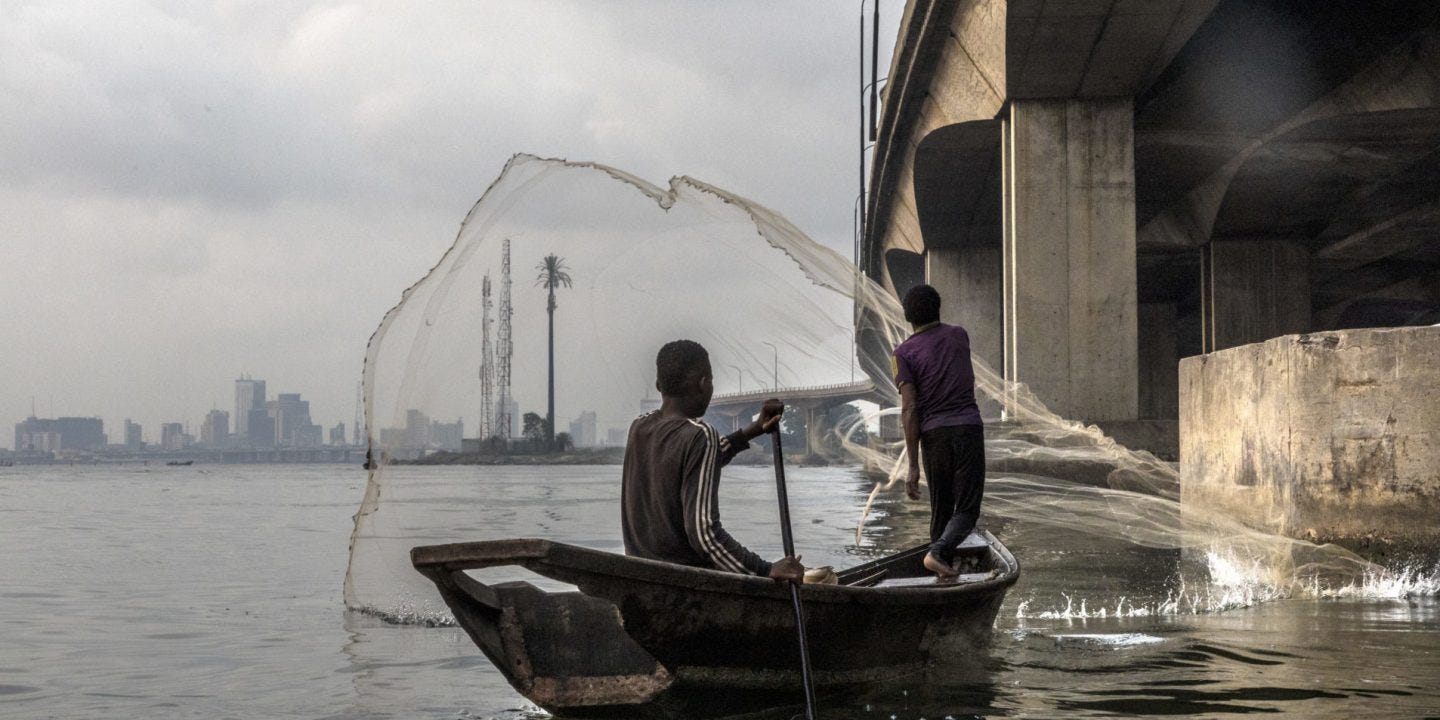How Climate Change is Altering Fishing on the Atlantic coast of Nigeria
Many deny the existence of climate change in the coastal areas of Nigeria. For them, it does not exist? But are they on the right track?
The Nigerian coast, CREDIT:Gabriel Yesuf
Agony shines in his eyes, and as his nose twitches with the fish smell in the air, he licks his lips, staring at me, holding his net, oblivious of the blare from a boat a few meters away.
“It has never been like this,” Joshua Adun says, glaring at the shore of the Atlantic Ocean near Yonren in Ondo State of Nigeria. “We used to have fish. But now, if you like, stay ten hours in the sea, you won’t get much. It’s so frustrating. Many have left the business. Some have taken to trading. I’m thinking about forgetting about the business.”
A recent report by Lydia Adeleke and others in Researchgate listed the consequences of climate change in the coastal region of Nigeria. They include the alteration in temperature, wind pattern, surging ocean, rainfall pattern, and water qualities and availability. These in turn bring a great reduction in aquatic resources, low fish catch, reduced fish production, slow growth rate. So it is no surprise that Joshua can’t catch as much fish as before, even if he spends all his days in the Atlantic Ocean.
The surging sea, CREDIT: Nigerian Tribune
Nigeria is getting hotter, wrote Peyton Fleming in Sustainable Energy for All in 2018, and it is expected to experience partial monthly mean temperatures of more than 30 degrees Celsius for 2020-2039. The world is becoming hotter too. For fish, this means, according to Climate Central, they would have to struggle in warmer waters, as it will make them less active.
The rate of chemical reactions generally increases at higher temperature, wrote Sunil Jain and others in 2013 in International Journal of Engineering Research & Technology (IJERT). The situation affects the biological activity of fish, because the temperature on water chemistry impacts on oxygen. Warm water holds less dissolved oxygen than cool water, so while it may be saturated with oxygen, it still will not contain enough for survival of aquatic life.
“Some compounds are also more toxic to aquatic life at higher temperatures,” wrote Jain and others. “For each organism there is a thermal death point. Also there is a range of temperature that produces optimal abundance. The effects of temperature upon life of a cold-blooded are profound. Each organism must be favored by the proper temperature if the individual or their populations are going to survive,” they said.
Furthermore, as the climate changes, habitats on the Nigerian coast have been degraded and biodiversity has been lost, just like in other places. Many fish have migrated towards the poles to follow the cooler seas, making fishing at high latitudes more productive while tropical fisheries suffer. The process takes place in other places of the world.
“Now we don’t get any fish to kill,” a fisherman told China Dialogue Ocean in 2019. “The fish is running further away.”
Trying to make ends meet, CREDIT: Andrew Esiebo
As the planet warms in the coastal area of Nigeria, the seasonality, biological productivity, and abundance of fish species are greatly affected.
“Marine life is forced to migrate to a favorable habitat where temperature and oxygen levels are optimal or at least survivable,” Moshood Mustapha, Professor, and Head of Department of Zoology at the University of Ilorin, told the Premium Times last year.
“The entire biology of these fishes and water quality parameters are disrupted, because as the ocean becomes warmer, it will be more acidic with lower oxygen levels,” Mr Mustapha continued.
Making business through fishing, CREDIT: Ahmed Jallanzo / EPA
The fisheries sub-sector in Nigeria contributes about 3-4 percent to the country’s annual GDP. It is also a key contributor to the nutritional requirements of the population, as it constitutes about 50 percent of animal protein intake. A substantial number of small traders and artisanal fishermen get their income and employment from the sector. But in the recent past, capture fisheries have been declining, and experts put the blame on change in temperature, because it forces fishes to migrate. Along with the increasing temperature, rising sea levels have been blamed for the decline in the catch of fish. This has led to a high dependence on imports, while aquaculture has been made one of the priority value chains targeted for development by the Nigerian government.
A fish seller in Lagos
Also, poor adaptation strategies and high dependence on fisheries expose small-scale fisher folks in most developing country to climate change, wrote Allison and others in 2009. These effects impact on fish species composition, production, and yield. Therefore, the fisher folk will have to seek adaptation and mitigation strategies in order to sustain their livelihood, a challenge that will play out in other countries.
Declining fish stock has also been attributed to CO2 emissions, which drive global climate change. The resultant inconsistent weather conditions may result in a 53 per cent reduction of fish resources in Nigeria by the year 2050, according to the World Bank, a scenario happening elsewhere. With fewer fishes to catch, you may not only miss your favorite seafood but also the livelihood of thousands of fishers is at risk.
Experts say that the impacts of climate change are expected to exacerbate the impacts of human pressure, which will further diminish the ability of natural ecosystems to continue to provide services and may cause invasion of strange species that are favored by climate change, thereby threatening biodiversity. According to Lucette Ade and others in their 2017 article on Scientific Research, climate change complicates life on earth, especially the migration of plants. It happens with the shifting of the algae species Sargassum natans and Sargassum fluitanss seaweeds from the Brazilian coast to new areas along the West African coastline. Their occurrence along the Nigerian coast and their effect on livelihood is counterproductive because of their link to coastal dwellers’ food security and economic activities. It could happen elsewhere.
“The coastal population knowledge about climate change and the reason of the occurrence of Sargassum species is limited due to low education level and information access limitations,” Lucette and others wrote. “Also, the population complained about the occurrence of another specie identified as Eichhornia crassipes which disturbs fishery and boats displacements. Moreover, changes in weather conditions particularly temperature have various consequences on the respondents’ livelihood by affecting their health, welfare, feeding and incomes. The population lamented about challenges of climate change and occurrence of Sargassum fluitans affecting fishery as they have no adaptation measures to cope with these situations.,” they wrote.
In an article titled Coping and Adaptive Approaches of Fisher Folks in Ilaje Fishing Communities, Ondo State to Impacts of Climates Siyanbola Omitoyin and her team of researchers wrote that fish stocks have been depleted as a result of climate change impacts in Ilaje Local Government Area of Ondo State, Nigeria, where a large number of people depend on water bodies for their livelihood. Their results show that coastal fishing communities in Ilaje had a higher livelihood vulnerability index (0.357) than the freshwater fishing communities (0.356), indicating relatively greater vulnerability to climate change impacts.
“It however shows that people in the freshwater regions were adapting and coping more than the people in the coastal regions as they were clearing the drainage and river courses to prevent flooding. They have access to farmland and farm produce, which is cheaper and easily accessible for them. They also have access to hospitals, good health care and make livelihood diversification. Conclusively, improving access to credit facilities could improve fishers’ capacity to diversify into other income-generating activities, provision of hospitals and other social facilities should also be provided,” they said
Aside from this, climate change in the coastal areas of Nigeria affects the differences in roles and activities men and women play in their vulnerabilities. Terry, Neumayer, and Plumper in 2007 suggest that women are generally more vulnerable to health implication of climate change, due to social inequalities between genders, arguing that the main health impacts are sexual and gender- based violence (SGBV) and trauma.
“Coastal communities are fighting not only illegal fishing or over-fishing, they also have to suffer from the impact of climate change,” Ifesinachi Okafor-Yarwood, a maritime security researcher at King’s College London, told Chinese Dialogue Ocean.
Unfortunately, depleting fish stock might pose a challenge to the West African region, especially as Nigeria has become the seventh country to reach a population of 200 million or more. It is still growing considerably faster than all other nations towards the top of the list and, by 2050, the UN expects Nigeria to have the world’s third-largest population. According to the World Bank, under a high CO₂ emissions scenario, there will be a 53% reduction in the country’s fish resources by 2050. So how can the people adapt in the presence of the harsh effects of climate change?
According to Mosunmola Lydia Adeleke and her co authors in a study titled Climate Change and Coastal Resilience in Nigeria, climate change is likely to alter the Nigerian coast through flooding due to its geography, climate, vegetation, soils, economic structure, population and settlement, energy demands, and agricultural activities. It will alter the water quality, species distribution, physiology, and population of the aquatic organism in the coastal areas of the country, causing food insecurity. Still,the fisher folk have various inadvertent and intentional adaptation strategies adopted for maximum fish production/catch, but they may not be enough, a condition playing out in other countries. Neumayer and others therefore recommended that Nigeria coastal communities develop local adaptation strategies such as construction of canals and channels, seawalls, and dikes to protect their houses and farms and sustain their livelihoods against climate change and flood disasters.
Empirical evidences on the effectiveness of mitigation and adaptation measures should be put in place to ensure scientific approach to the problem at hand, wrote I. Magawata and J.K. Ipinjolu in Science Alert . To this end, measures of weather monitoring and forecasting need to be intensified.
“High quality research that involves resource users, build strong partnerships and harness political will for implementation of the adaptation and the mitigation measures is crucial for making fisheries and aquaculture systems more resilient to the challenge of global climate change and securing a bright future for the people that depend upon them,” they wrote.
According to Robert Ugochukwu Onyeneke and his team of writers in Wiley Online Library, investing in adaptation enhances fish farming profit.
“In order to achieve increased farm profit, climate resilience and food security, government and other stakeholders in developing countries should prioritise investments in the adaptation of fish farming to climate change,” they wrote.
Hopefully, the climate change bill in countries such as Nigeria will ensure an efficient implementation of government policies and programs geared toward naturally addressing climate change.
Apart from making the Nigerian government and key players in the sector have a legal backing for the implementation of climate change policies and programs, it would force organizations and individuals to become more responsible and accountable for their actions and activities as related to the climate. Also, it will provide a framework for achieving low greenhouse gas emissions (GHG).
If Nigerians commit themselves to these values, fishing in the coastal areas may yet overcome the climate change challenge. The same thing happens to other places too, because the coastal areas of Nigeria can be seen as a metaphor for everywhere connected to climate change.
You can subscribe for free below.
If you want to make comments, do it below








